Can not find why this program is failing. It must be my boost usage. Problem is highlighted in comment and there is a small note about some of the function calls
/* Includes Hidden */
using boost::asio::ip::udp;
class UDP_Server {
public:
UDP_Server(boost::asio::io_service& IO, unsigned short PORT)
: sock(IO, udp::endpoint(udp::v4(),PORT)) {
Listen();
}
~UDP_Server() {
for(auto& endpoint : Clients) {
delete endpoint;
}
Clients.clear();
}
void Listen() {
//waits for msg to be sent. Captures end point and sends address
//so server can store connections
udp::endpoint* T = new udp::endpoint;
sock.async_receive_from(
boost::asio::buffer(rbuf),*T,
boost::bind(&UDP_Server::handle_rec, this, T,
boost::asio::placeholders::error,
boost::asio::placeholders::bytes_transferred));
}
void handle_rec(udp::endpoint* EP, const boost::system::error_code& err, size_t len) {
//When the program enters here, err is 234 (windows error for more data available)
//len is 0 and rbuf is empty.
if(err && err != boost::asio::error::message_size) {
std::cerr << err.message() << std::endl;
}
std::cout.write(rbuf.data(),rbuf.size());
bool ThisClient = false;
std::string Msg = "";
for( auto& EPs : Clients) {
if(EPs == EP) {
ThisClient = true; break;
}
}
if(!ThisClient) {
if(len > 0 && rbuf[0]=='0') {
Clients.push_back(EP);
Msg = "Connected";
}else{
Msg = "Connection Refused";
}
}else{
if(rbuf[0]=='0') {
delete EP;
Clients.remove(EP);
Msg = "Disconnected";
}
}
//queue message to send back and call handle_snd function
sock.async_send_to(boost::asio::buffer(Msg),*EP,
boost::bind(&UDP_Server::handle_snd,this,EP,
boost::asio::placeholders::error,
boost::asio::placeholders::bytes_transferred
));
Listen(); //listen for some more messages!
} //debugging through the first time through this function eventually exits here
//and ends up going through a bunch of code I didn't write, and ultimately fail.
void handle_snd(udp::endpoint *Dest, const boost::system::error_code& err, size_t len) {
}
private:
udp::socket sock;
std::list<udp::endpoint*> Clients;
std::vector<char> rbuf;
};
void HostStart() {
try {
boost::asio::io_service io;
UDP_Server Host(io,13);
io.run();
}catch(std::exception& e) {
std::cerr << e.what() << std::endl;
}
}
int main() {
std::thread thd(HostStart); //start server
try {
boost::asio::io_service io2;
udp::resolver res(io2);
udp::resolver::query queer(udp::v4(),"127.0.0.1","daytime");
udp::endpoint HostEP = *res.resolve(queer);
udp::socket sock(io2);
sock.open(udp::v4());
std::string Msg = "0";
std::vector<char> MsgArray(Msg.begin(),Msg.end());
sock.send_to(boost::asio::buffer(Msg),HostEP);
io2.run();
udp::endpoint RecEP;
std::array<char,128> rbuf;
sock.receive_from(boost::asio::buffer(rbuf),RecEP);
std::cout.write(rbuf.data(),rbuf.size());
sock.send_to(boost::asio::buffer(Msg),HostEP);
sock.receive_from(boost::asio::buffer(rbuf),RecEP);
std::cout.write(rbuf.data(),rbuf.size());
}catch(std::exception& e) {
std::cerr << e.what() << std::endl;
}
Sleep(10000);
return 0;
}
If I use debugging and walk through this code, I find that I ultimately end up in a file called
win_iocp_io_service.ipp
and I get this error:

In my main, I'm just trying to synch send a couple message to test the asynch server class. I have no idea why the buffer is empty after the async server call and why I am getting this error.
Possibly it is related to when I call run on my io service and the way I am trying to multithread it.
Thank you